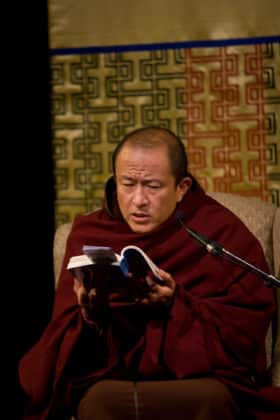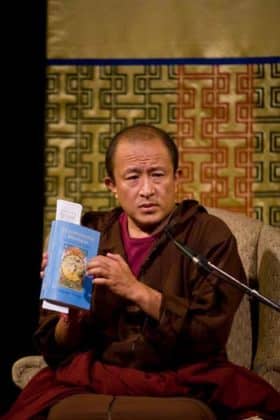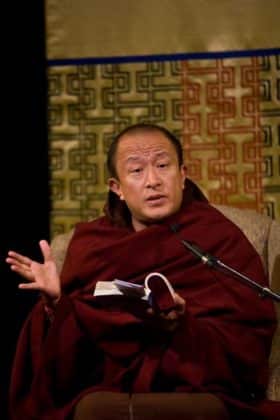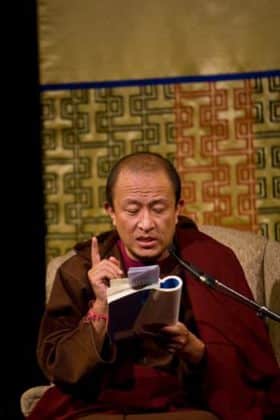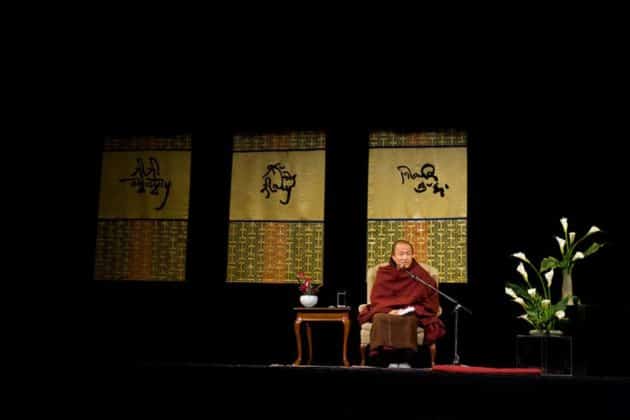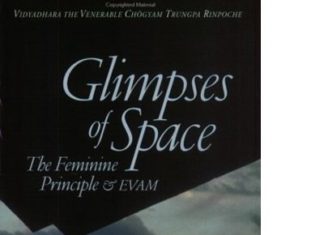By Bakes Mitchell
Dzongsar Jamyang Khyentse Rinpoche teachings in Halifax: Transcending Madness The teachings are on the six bardos, based on the Vidyadhara’s book with the same title. Friday afternoon, 2:30 pm: Went by the Halifax Shambhala Centre to pick up my tickets. I have a come-from-away staying with me, who got connected with me through a mutual friend. I show her the sites like the main shrine room and the kitchen. There are over 500 people registered for the program. Registration isn’t quite sure but estimates that 15%-20% are come-from-aways. I meet five old friends from Colorado and the west coast in as many minutes. The registration process is quick, efficient, chatty and pretty empty. We receive a very nice registration badge with a colour reproduction of the cover of Rinpoche’s book (the Vidyadhara Rinpoche, not Jamyang Khyentse Rinpoche) Transcending Madness with our name on it—it’s a keeper, a fond memento, another thing to stuff into that top drawer because I don’t want to throw it out and don’t know what to do with it. I think it’s going to be a mob scene at the McInnes Room (a large hall in the Dalhousie Student Union) this evening.
Friday evening, 6:47 pm: The talk starts at 7 pm so I seem to have skipped the mob scene and, in good Vajradhatu fashion, almost the beginning of the talk. Rinpoche is always right on time and waiting to begin. We had issues getting out the door. And the holiday traffic is enough to really and practically challenge my bodhisattva vows. Really! Who would try to make a left from Oxford onto Quinpool on a Friday evening! All the shoppers are out. All the Christmas festival goers are out. Either that or it’s going to be a much bigger crowd than expected at the talk. And I’m late and they are in my way! Aarrrggghhhh! Humbug!
6:57 pm: I’m not the only one late. Thank goodness. It may have been a mob scene once but now I’m having trouble finding a seat. I find a couple seats in the far corner and on the way I see so many old friends it’s like a high school reunion, but a good one, not like that one when… Anyway, lot’s of chattering and hellos across the room, big hugs, oh-my-gods… My daughter Claire is with me and there are a lot of teenagers here. She’s doing the same thing chattering, hellos, but she just saw her friends an hour ago. Time is relative but I’m getting ahead because that’s actually one of the points Rinpoche makes in the talk.
Sometime shortly after 7 pm: Introductions. Rinpoche peeks his head out from the curtain and almost shyly makes his way across the stage. Carolyn Gimian makes the introductions and asks us to “Give it up” for Dzongsar Jamyang Khyentse Rinpoche, which the crowd enthusiastically does. I don’t know, it seems like there are at least 500 people here, probably more.
Rinpoche begins by talking about the Vidyadhara. He talks about how much the Vidyadhara accomplished in his 47 years (the same age Jamyang Khyentse Rinpoche is now) the depth, the vastness inconceivable! Even the most seasoned practitioner can get something new from every line. Rinpoche says even the questions are good, which is just another sign of a really good teacher.
Wow, he’s singing to the choir here. It feels so good to hear him talk about his immense appreciation for the Vidyadhara and how much the Vidyadhara inspired him. He also makes a crack about Halifax which is kind of like getting a dutch rub from your uncle at a holiday dinner you know it’s coming, you kind of like it and kind of don’t, but the evening isn’t complete until it happens.
At some point, the main part of the talk begins. I’m actually kind of spaced out—I think I’m getting a cold. Rinpoche sets out a 40,000 ft view of the bardos. This is all a bardo, not just this life, but all our many lives from the time we (somehow) split from the basic ground of Buddha-nature until attaining enlightenment, which is not other than realizing we never actually did split from the basic ground, really. Better listen to the talk, actually. I’m not sure I got this correctly. And aside from not trusting my Buddha-nature and not being enlightened, I don’t have a Kleenex.
The experience between each of these two points (or towers, Rinpoche is calling them), the Vidyadhara called madness. But really there aren’t two towers, they’re both empty. And there is no ultimate time—time is relative. All the time from the point you step onto the path, through countless aeons of bodhisattva practice, until you attain enlightenment once you attain enlightenment, it’s going to seem like the length of time a spark glows when it shoots out of a fire. (Are you following this)? We’re skipping around a bit, surveying all of existence and non-existence, and I still don’t have a Kleenex.
At this point, Rinpoche says he could take some questions, or perhaps we need a bathroom break, or should we stop there for tonight. A girl in front of me quietly gets up and discretely moves toward the aisle. But the crowd does not want the talk to stop. Someone grabs the poor girl and shouts out that she has a question. Confusion, whispering, pulling away, and she makes an embarrassed dash out the door. Whoops—no question, she just needed a bathroom break. So it’s on to questions. I decide to make a dash for the bathroom myself. I need that Kleenex fast!
Rinpoche ends the talk with a quick overview of all six bardos. I’m exhilarated, but a bit dizzy from surveying all of existence, from my original nature (one tower) through the madness of the illusory path and bardos (all that bit between the towers) to the illusion of enlightenment (which is the other tower), all in one evening. It kind of reminds me of that ride at Epcot where you go from the Big Bang to the end of the universe in about an hour. Except that Rinpoche is actually a lot more fun than Ellen DeGeneres.
I’ve enjoyed the ride and somehow it all makes a bit more sense than it did. Somehow it leaves me feeling hopeful. Sure it’s immense, sure there are countless lives, but somehow I have a really strong sense of all of our Buddha-nature and the feeling that it’s somehow okay and even enlightenment won’t change the fact that we’re all actually Buddhas and we’ve just kind of temporarily and inconveniently forgotten. And we’ve got all these opportunities to remember that. Even death, which usually scares me to… well, death seems like just another phase in what only appears to be a long passage from Buddhahood to Buddhahood. Even with a streaming nose, and a searingly cold Halifax wind, I feel pretty good. Which is actually great.





